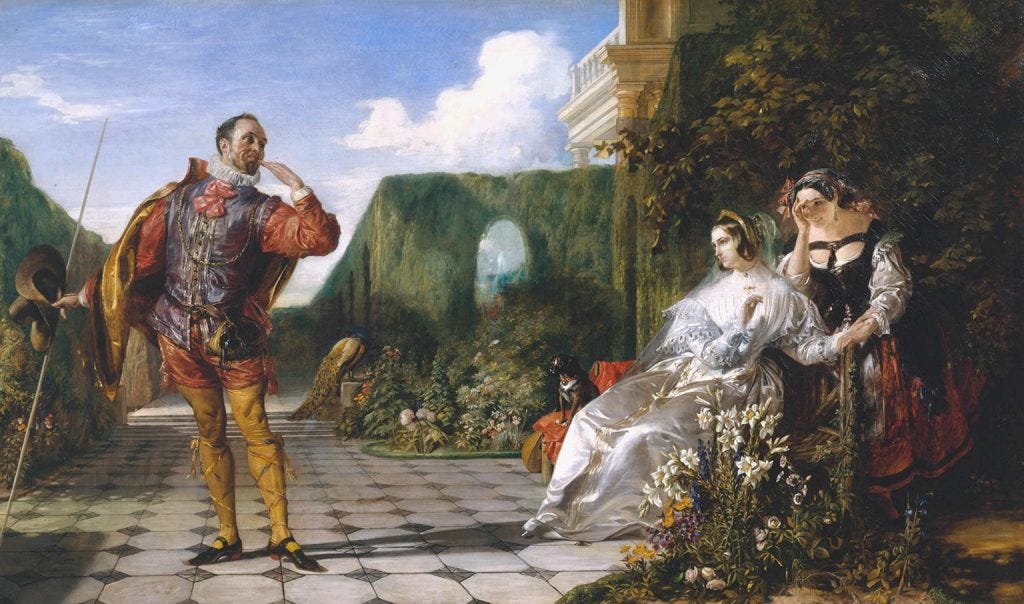
Happy Holiday Season to all who celebrate in the Northern Hemisphere, the Southern Hemisphere, and all other locations in space and time. This jovial little post on story-telling is an update from my blog at triskelionbooks,com. Enjoy!
Good stories are multifaceted, built with layer upon layer of meaning. The best stories reward you for returning again and again to analyze and uncover new layers. Often these deep levels of meaning are profound. Sometimes they are just fun.
Of all the great story-tellers, William Shakespeare may be the GOAT. (You know, the Greatest of All Time.) I’ve read most of his plays, and seen live performances dozens of times. One of top favorites is Twelfth Night. Great love story, sly gender confusion and trickery, terrific comic subplot, fantastic villain.
Story Summary
In case you’re not a Shakespeare nerd like I am, here is a brief plot summary. (You can read a more detailed synopsis here.)
Viola, a young noblewoman, is shipwrecked on the coast of Illyria. She has lost contact with her twin brother, Sebastian, whom she believes to be drowned. Fearing for her own safety, she disguises herself as a young man under the name Cesario and enters the service of the local Duke, Orsino.
Orsino has convinced himself that he is in love with the Countess Olivia, who is mourning the recent death of her brother. She refuses to be in the company of men or accept marriage proposals until seven years have passed. Orsino uses 'Cesario' as an intermediary to profess his passionate love to Olivia. Olivia, however, falls in love with 'Cesario', setting her at odds with her professed duty. In the meantime, Viola has fallen in love with Duke Orsino.
So Viola loves Orsino, Orsino loves Olivia, and Olivia loves Viola disguised as Cesario. Got it?
Meantime, Olivia's riotous uncle, Sir Toby Belch, is carousing and drinking with a silly squire named Sir Andrew Aguecheek, along with Olivia’s servants and a witty fool, Feste. When the prim and prompter steward, Malvolio chastises them, Sir Toby plans revenge. He and his chums convince Malvolio that Olivia is secretly in love with him, by planting a forged love letter. It asks Malvolio to wear yellow stockings cross-gartered—a color and fashion that Olivia actually hates—to be rude to the rest of the servants, and to smile constantly in the presence of Olivia.
Malvolio finds the letter and reacts in surprised delight. He starts acting out the contents of the letter to show Olivia his positive response. Olivia is shocked by the changes in Malvolio and, agreeing that he seems mad, leaves him to be cared for by his tormentors. Pretending that Malvolio is insane, they lock him up in a dark chamber.
Meanwhile, Viola's twin, Sebastian, has been rescued and reaches Illyria. Taking Sebastian for 'Cesario', Olivia asks him to marry her, and they are secretly married in a church. Finally, when 'Cesario' and Sebastian appear in the presence of both Olivia and Orsino, there is much wonder and confusion at their physical similarity. At this point, Viola reveals her identity and is reunited with her twin brother.
The play ends in a declaration of marriage between Duke Orsino and Viola. Malvolio is freed. He swears revenge on everyone and stalks off, but Orsino sends a man to placate him.
Two Hidden Layers
So here are a couple of those more obscure, fun layers of meaning that I mentioned.
One thing that’s interesting is the similar names of several of the characters—Malvolio, Olivia, and Viola. All share the same letters.
According to the website BehindtheName.com, the name Malvolio was invented by Shakespeare and means “ill will” in Italian. From the same site, we learn that “Olivia” was also first used in Twelfth Night, and is probably derived from the name of the olive tree. “Viola” meanwhile, is Latin for violet.

So if we think of all characters as being projections of the author, and recall that Shakespeare went by the name “Will,” we have Malvolio, or the bad Will. We also have Olivia, the Will who is like the olive, because she is bitter and melancholy. And Viola, the Will who is bright and clever.
Okay, those last two might be a bit of a stretch.
But then again, Shakespeare subtitled the play “What You Will.”
Hmmm.
One line that’s always been a bit of a mystery is in Act 2, Scene 5. Malvolio is reading a letter left for him to find by the servant Mary and meant for him to mistake as coming from the Countess Olivia. The letter does not name him, but hints at his name by spelling out M O A I. Malvolio puzzles over whether this is meant to be him, and then reads:
“If this fall into thy hand, revolve…” and there follows the famous quote that “Some are born great, etc.”
But “revolve”? This is sometimes played on stage for comic effect by Malvolio twirling around. That’s good.
And, according to Merriam-Webster, one of the meanings of the word revolve actually is to “ponder” or “turn things over in the mind.” Also good.
But my brilliant wife once discovered that if you literally revolve the page (turn it upside down) and look at the letters MOAI…
you get something that looks very much like “I VOW”…
…which also fits the meaning of the text.
Hmmm.
So, the next time you reread a favorite story or play, or see a favorite movie, I urge you to revolve, and look for those extra, deep layers of meaning. It can be fun!





